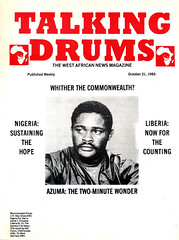Protecting the Ghanaian child
By John Owusu
The UNO declared 1979 as the International Year of the Child. The prime concern of this declaration was to ensure the rights of the child including the right to a normal and healthy development in terms of adequate and proper nourishment, ac- commodation, medical care and the right to be educated.
The present socio-economic climate in Ghana seems to have been relegated to the background, the expected obligations of the society to its children. Therefore the country's commitment to the UN declara- tion has, at best, been only on paper.
The right place to sleep for the ordinary Ghanaian children is on a mat on the floor. They eat at appreciable distance from their father's tables; in the bus the Ghanaian society sticks to traditional respect for age and children are expected to get up from their seats for an adult to sit down though the child is often too short to reach the hooks provided for standing passengers.
In the market places, children are always seen playing around. They play in the dust and in the process pick from the ground unhygienic things which may harm their health. At the charcoal sellers at the roadside or somewhere in the suburbs the spectacle of children smeared with coal dust and also breaking in coal dust is unnerving. If the rains fall, parents unconcernedly look on as their kids swim and play in dirty pools of water.
A few minutes ride to the city centres of Accra, Tamale, Sunyani, Ho, Kumasi and other urban areas gives one a foreknowledge of the type of future leaders the country should expect. Economic refugees in their own country, children dominate the dog chain trade. They also sell newspapers, roasted and boiled foods, ice cream, cigarettes, second-hand clothings etc. in order to earn pocket money, or in many cases help their parents survive the country's touch and unbearable economic conditions.
With all the good intentions of the government to supply textbooks free to school pupils the main complaint of many public school teachers is lack of textbooks. This is basically because the Ghana Education Service has been crippled by operational constraints like lack of foreign exchange to import books and other inputs to publish some locally and high incidence of pilfering of books at the distribution centres.
The search for greener pastures by Ghanaian teachers outside the country has had a disastrous effect on the intellectual development of school pupils. Many certified trained teachers unceremoniously left their pupils and classrooms for neighbouring countries notably Nigeria, Liberia, Sierra Leone and Libya (official- ly encouraged) for economic shelter and security. Their places as educational exigencies demanded had been filled with untrained pupil teachers who had to be pushed through brush-up courses to improve their output. Naturally there has consequently been apathy among the few remaining patriotic teachers.
The recent official increases in school-fees for non-public schools have blocked the chances of the pupils from the ordinary man's house to privately organised schools. Good schools are now the exclusive domain of the sons and daughters of the rich.
This is the current picture of the Ghanaian child. The question then is: are our present policies doing anything to stem this degenerative situation or exacerbate it?
